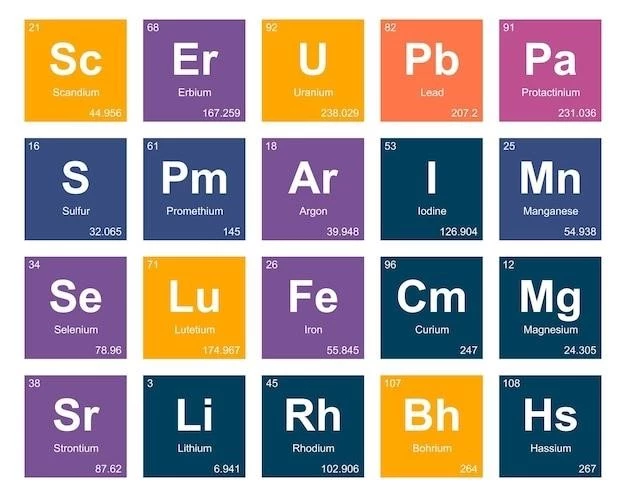Selenium⁚ Uses and Benefits
Selenium is an essential mineral with numerous benefits for overall health. It plays a key role in thyroid function, immune system support, fertility, cancer prevention, asthma management, and neuroprotection. Selenium deficiency can lead to various health complications, so it is crucial to consume an adequate amount either through food sources like Brazil nuts, meat, and seafood, or supplements if advised by a healthcare provider.
Introduction to Selenium Uses
Selenium is a crucial trace element necessary for various bodily functions, such as thyroid hormone metabolism, immune system support, antioxidant defense, fertility, cancer prevention, asthma management, and neuroprotection. It can be obtained through dietary sources like Brazil nuts, meat, seafood, or as a supplement, especially for individuals with selenium deficiency.
Selenium Deficiency⁚ Symptoms and Treatment
Selenium deficiency is rare in regions with sufficient soil content, but inadequate intake can lead to health issues such as muscle weakness, fatigue, thyroid problems, and a higher risk of infections and diseases. Treatment involves ensuring a balanced diet rich in selenium sources like meat, fish, nuts, and whole grains. In severe cases, supplements can be recommended after consulting a healthcare provider.
Symptoms of Selenium Deficiency
Symptoms of selenium deficiency can manifest as muscle weakness, fatigue, thyroid issues, and increased susceptibility to infections and diseases. Ensuring an adequate intake of selenium through a balanced diet rich in sources like meat, fish, nuts, and whole grains is crucial to prevent and address these symptoms. In severe cases, consultation with a healthcare provider for potential selenium supplementation may be necessary.
Treatment of Selenium Deficiency
The treatment for selenium deficiency involves incorporating selenium-rich foods like Brazil nuts, meat, seafood, and whole grains into the diet. In cases of severe deficiency, supplementation with selenium supplements under the guidance of a healthcare provider may be necessary to address the imbalance effectively.
Selenium Toxicity⁚ Side Effects and Risks
Although selenium is beneficial in proper amounts, excessive intake can lead to toxicity. Side effects of selenium toxicity may include hair loss, brittle nails, skin rash, gastrointestinal disturbances, fatigue, and irritability. It is crucial to adhere to recommended dosages and consult healthcare providers before selenium supplementation to avoid such risks.
Side Effects of Selenium Toxicity
Excessive selenium intake, leading to toxicity, can result in side effects such as hair loss, brittle nails, skin rash, gastrointestinal disturbances, fatigue, and irritability. It is important to be cautious with selenium supplements to avoid these adverse effects and consult healthcare providers for guidance on safe selenium consumption.
Risks Associated with Selenium Toxicity
Excessive selenium intake can lead to toxicity, resulting in risks such as liver and kidney damage, blood clotting issues, necrosis of the heart and other organs. Carefully monitor selenium intake to avoid these severe consequences, especially when consuming supplements above the recommended dosages.
Selenium in Foods⁚ Natural Sources and Importance
Selenium, found naturally in soil and foods like Brazil nuts, contributes to various critical bodily functions. This mineral is crucial for thyroid health, immunity, fertility, and cognitive function. Consuming selenium-rich foods like nuts, meat, seafood, and whole grains is essential to maintain optimal selenium levels and support overall well-being.
Natural Sources of Selenium in Foods
Foods rich in selenium include nuts, rice, whole-wheat bread, fish, poultry, eggs, and meats like beef, chicken, and pork. Consumption of these natural sources can help maintain optimal selenium levels crucial for various bodily functions. Ensuring a balanced diet with selenium-rich foods is key to preventing deficiency and supporting overall health.
Importance of Selenium in Diet
Selenium is crucial for overall health, supporting thyroid function, immune system strength, reproductive health, neuroprotection, and cancer prevention. It is essential to include selenium-rich foods like nuts, meats, and seafood in your diet to ensure proper selenium levels for these vital bodily functions.
Selenium Supplements⁚ Dosage and Recommendations
For individuals with selenium deficiency, supplements like selenomethionine or sodium selenate may be beneficial. It is crucial to follow recommended dosages to avoid adverse effects. Consulting a healthcare provider for guidance on the right selenium supplement and dosage is essential to address deficiency effectively while minimizing the risk of toxicity.
Dosage Guidelines for Selenium Supplements
When considering selenium supplements for deficiency, options like selenomethionine or sodium selenate are common. For safe intake, it is vital to follow the recommended dosage to prevent adverse effects. Consult healthcare professionals to determine the suitable selenium supplement and dosage for addressing deficiency effectively.
Recommendations for Selenium Supplement Use
When considering selenium supplements to address deficiency, it’s crucial to stick to recommended dosages to prevent any potential adverse effects. Consulting healthcare providers for guidance on the appropriate selenium supplement type and dosage is essential for effectively managing deficiency while minimizing risks.

Selenium Interactions with Other Drugs
Before taking selenium supplements, consult healthcare providers as they may interact with certain medicines. For instance, the chemotherapy drug cisplatin can impact selenium levels. Understanding potential interactions and seeking guidance is essential to ensure optimal health and well-being.
Potential Interactions between Selenium and Other Drugs
When considering selenium supplementation, be aware of potential interactions with medications. For instance, the chemotherapy drug cisplatin can lower selenium levels, impacting overall health. Consult healthcare providers to understand how selenium supplements may interact with other drugs you are taking for comprehensive care and optimal well-being.
